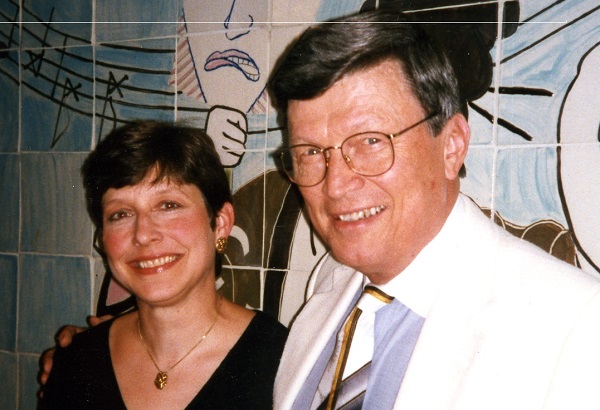An Interview with H. Royce Saltzman
By Kathy Saltzman Romey, Director of Choral Activities at the University of Minnesota and Artistic Director of the Minnesota Chorale.
Throughout my life, I have been fortunate to have many wonderful teachers, advisors, and mentors. I have been especially blessed that my father – H. Royce Saltzman – has served in all of these roles. His work as conductor, educator, co-founder and executive director of the Oregon Bach Festival, national past president of ACDA, and founding member and past president of the International Federation for Choral Music, made a profound impact on my life and career in choral music, and on the lives of countless others active in the profession today. Through his vision, artistry, diplomacy, passion, service, and commitment, I have come to appreciate the significant role choral music can play within society to further understanding between diverse peoples and cultures. It is with great pride and admiration that I share the following interview, which reflects some of the insight, wisdom, and counsel I have been privileged to receive these many years.
Romey: How did you first become interested in choral music?
Saltzman: As a boy, living in Abilene, Kansas, I attended a church that did not allow musical instruments in worship. The congregation sang unaccompanied hymns in four parts, my father being the song leader. Almost every week people came to our house to sing…quartets, octets, etc. These “gatherings” were important social events that supplanted movies and dances, also forbidden by the church. So, I grew up with an understanding of and a love for vocal music. Singing became an integral part of my life from boyhood to the present day.
Romey: Were there specific individuals in your life who were influential in furthering your interest in choral music?
Saltzman: My parents, of course; but three other people served as mentors: conductors Earl Miller at Messiah College and Mary Oyer at Goshen College, both of whom placed a strong emphasis on the unaccompanied tradition; and at the University of Southern California, Charles Hirt. The influence of these three persons solidified my commitment to the choral art, and shaped my desire to become a conductor, teacher and administrator.
This was especially true at the University of Southern California (USC), where Charles Hirt opened doors for me––as his assistant in conducting, teaching, and administration––that laid the foundation for future leadership roles. He became a role model, who “mirrored” to me, daily, the kind of musician I wanted and needed to be. In a real sense, I am an extension of these persons, a reminder that each of us has a unique opportunity to influence those with whom we work. It is a high calling that must be taken seriously, because the impact one makes on the lives of students and singers can be the cornerstone on which they build their life’s work.
Romey: So much of your career has been in administration. When did you first become involved in music administration and how did you develop these skills?
Saltzman: My first real taste of administration was at USC. When Charles Hirt went on a sabbatical leave I was appointed acting head of the Department of Church Music for a brief period of time. Later, for eleven years, I served as associate dean and graduate coordinator of the School of Music at the University of Oregon, and as director of summer session for twenty-one years.
At the university, I was foremost a teacher and conductor, but I found that the creative aspect of administration was also rewarding. I was inspired by the opportunity to be innovative and imaginative, feeling that not only could I make a contribution in the class-room and on the podium, but also in developing programs that would enhance the choral profession. It was during this period of time that I became deeply involved in a leadership role with the American Choral Directors Association. And it was the time when the germinating seed of the Oregon Bach Festival was planted.
How did my administrative skills develop? Most important, were the challenges of ideas and ways to realize them: starting with something new and nurturing it to maturity. The birthing process was often difficult, but the results, when successful, were very rewarding. I know that there were “hits-and-misses” along with successes. But, because I enjoyed the challenge, my future as an administrator was charted!
Romey: When were you president of ACDA and what do you feel was significant during your presidency?
Saltzman: I was president from 1979 to 1981. Several things happened during my tenure that I like to think added to the effectiveness of ACDA.
Colleen Kirk and I believed strongly that the leadership throughout the organization, state and division presidents specifically, lacked an understanding of responsibility, i.e., what was required of them in their respective administrative positions. In many cases, it was a shoe-box containing correspondence that was passed on to an officer’s successor. Simply put, there were no guidelines or job descriptions to guarantee efficiency or productivity.
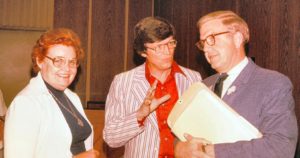
With support from the national office and a grant from the National Endowment for the Arts, ACDA’s first Leadership Conference was held at Cameron University, Lawton, OK, in 1979. It included workshops on finance, leadership, newsletters, an overview of ACDA as an organization, and much more. It was an administrative milestone for strengthening the governance of the Association. Today, the Leadership Conference is an integral part of ACDA’s administrative structure.
My President’s Column in the Choral Journal advocated for an ACDA archive.1 Walter Collins took up the mantle and became the driving force in making this a reality.2 I was a proponent for an endowment that would ensure the financial stability of ACDA. Gene Brooks set this in motion.3 I felt strongly about the importance of establishing dialogue with international colleagues and organizations.
Perhaps the most controversial decision was the separation of the rapidly expanding North Central Division into two geographic regions: North Central and Central. It was a heated debate that aroused emotions both pro and con. North Central had strong leadership, a thriving membership, and quality programs. So, why break up the family? The level of growth and geographic size warranted separation. The North Central Division was reduced from ten to six states, and the Central Division became four states. Thirty years later, perhaps the adage, Less is More, has proven to be true.
Romey: How were you involved in the founding of the International Federation for Choral Music (IFCM)?
Saltzman: Numerous choral leaders discussed the concept of an international organization that would facilitate cooperation and exchange between choirs, educational institutions, and national organizations over an extended period of time. I attended meetings in Lucerne (1979) and again in Paris the following year, when this idea was discussed.
At the 1981 ACDA National Conference in New Orleans, I initiated a choral summit, attended by leaders from thirteen countries: Robert Solem (Canada); Ma Ge-shun (China); Waldo Aranguiz (Chile); Marcel Corneloup, Marcel Couraud, Claude Tagger (France); John Poole (Great Britain); Christoph Kühlewein, Walter Weidmann, Herbert Sass, Paul Wehrle (Germany); Takashi Iijima, Kan Ishi (Japan); Oriol Martorell (Spain); Eskil Hemberg (Sweden); Willi Gohl (Switzerland); Vialimirov Sokolov (USSR); Alberto Grau (Venezuela); James Bjorge, Gene Brooks, Walter Collins, Maurice Casey, Charles Hirt, Colleen Kirk, and Russell Mathis (United States).4
The group addressed issues such as touring, education, the sharing of information and materials, but foremost, the possibility of establishing an international organization that would facilitate cooperation and exchange. The camaraderie among the group was electric, best described in a letter that Charles Hirt wrote to the publisher Don Hinshaw.
These days were afire with enthusiasm and feeling of destiny, with the realization of what a world singing together could accomplish, freed from politics and pettiness. I shall never forget the final moments of farewell, when, spontaneously from the back of the room, Walter Collins began to sing the round Dona Nobis Pacem, and how it soon filled the room with singing, and our eyes with emotion.5
Subsequently, I chaired an interim committee that met in Loughborough, England, to (1) establish statutes, (2) choose a name that would represent its global outreach, and (3) determine Founding Organizations, which would provide support and validity to this fledging alliance. Thus, in 1982 the child IFCM was born.
Romey: You served as President of IFCM during its early years. When was this and what do you feel was significant during your presidency?
Saltzman: Paul Wehrle (Germany), a visionary and long-time proponent of a world choral organization, was IFCM’s first president from 1982-85. I succeeded Paul, serving as President for eight years, and later, for a short period, as interim due to the death of then President, Claude Tagger (France). Other presidents have included Maria Guinand (Venezuela), Eskil Hemberg (Sweden), Lupwishi Mbuyamba (Mozambique), and the interim incumbent, Michael Anderson (USA). IFCM’s Executive Committee and Board of Directors is comprised of persons from nineteen countries, and its Board of Advisors, from fifteen countries.
What was significant during my presidency?
First. In the early years of IFCM, a primary objective was to build relationships with like-minded leaders world-wide, colleagues who understood that the language of singing has the power to unify people regardless of differences in cultural background, political ideology, religion, language, or race. And that collectively, through IFCM, we could make a difference globally and within our respective countries. In a real sense my responsibility was ambassadorial.
Second. I valued the opportunity to be involved in the creative process of planning the first three world symposia: Vienna, Stockholm, and Vancouver specifically. Vienna was difficult because IFCM was entering uncharted waters in planning a world symposium. Three years later, Stockholm, with ancillary programs in Estonia and Finland, and Christian Ljunggren as the local chair, was exciting. Performances included the Swedish Radio Choir; the Brahms Requiem, with the USSR State Choir, members of the World Youth Choir (representing twenty-five countries), Schola Cantorum de Caracas, the Arnold Schönberg Choir, and the Swedish Radio Orchestra with Robert Shaw conducting. In Estonia, a choral walking tour of Tallinn and the Estonian Philharmonic Chamber Choir; and in Finland, Krzysztof Penderecki conducting his Polish Requiem with the Finnish Radio Orchestra, The Dale Warland Singers, Suomi Chamber Choir of Finland, and Ave Sol Chamber Choir from Latvia. It was a global triumph! In Vancouver, working with a superb planning committee comprised of persons from the British Columbia Choral Federation, we introduced for the first time a chorus from the People’s Republic of China, and Exaudi, a chamber choir from Cuba. In a real sense, these symposia laid the ground-work for those that followed.
Romey: What are some of IFCM’s most important contributions to the choral art?
Saltzman: Unquestionably, its World Symposia held every three years. First in Vienna (1987), then Stockholm (1990), followed by Vancouver (1993), Sydney (1996), Rotterdam (1999), Minneapolis (2002), Kyoto (2005), Copenhagen (2008), and in 2011, Puerto Madryn, Argentina. This 7-day event of performances, workshops, and master classes speaks clearly to the aims and objectives of the Federation, offering a global perspective of choral music not found elsewhere.
Other significant contributions are the World Youth Choir, the International Choral Bulletin (the official publication of IFCM), the World Choral Census (a compendium of choral leaders and organizations throughout the world), MUSICA International (a data-base of 156,000 titles of choral repertoire), Commissions, Songbridge (a forum for children’s and youth choirs), the International Day of Choral Singing, and the Cantemus Choral Series that focuses on international choral repertoire.
Today, IFCM’s membership is comprised of two thousand members worldwide in four categories: individuals, choirs, organizations, and businesses. It is also the official choral representative on the International Music Council of UNESCO.
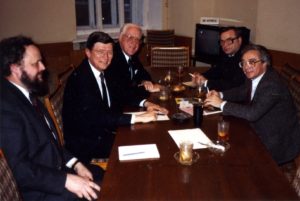
Romey: The Oregon Bach Festival (OBF) will commemorate an important milestone this year. How did the Festival begin and how has it grown and developed over the past forty years?
Saltzman: It is hard to believe that 2010 marks four decades of the Oregon Bach Festival, an event that was never planned, but simply evolved over a period of years.
In 1968-69 I was director of the University of Oregon’s International Center for Music Education, the emphasis of which was church and choral music. Students enrolled at the university in Eugene, but took their coursework at the Pädagogische Hochschule in Ludwigsburg, Germany. John Haberlen, former president of ACDA, is an alumnus of that student group. It was during this academic year that I met Helmuth Rilling, a little known Swabian conductor from Stuttgart.
The following year, these two young choral conductors, Helmuth Rilling from Stuttgart, and Royce Saltzman from Eugene, planted the seeds for what would become a summer music festival. The format of that first inconspicuous music event brought together two important components: education and performance – master classes for the professional musician, and lecture/demonstrations for the amateur musician and audience, which culminated in a series of concerts with emphasis on the music of Bach.
Although the Festival has emphasized the music of Bach, works by composers such as Brahms, Beethoven, Haydn, Monteverdi, Mozart, and Verdi have been performed. Music by living composers has also been a priority. In 1994, the Festival commissioned Arvo Pärt to compose Litany. Osvaldo Golijov in 1996 composed the cantata, Oceana. In 1998, as a joint collaboration with the Internationale Bachakademie Stuttgart (IBA), Krzysztof Penderecki was commissioned to write Credo, the recording of which was voted “Best Choral Performance” at the 43rd Grammy Awards Ceremony. And most recently, in 2009, a second collaboration with the IBA, Sven David Sandström’s Messiah.
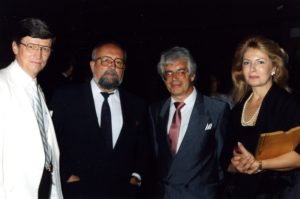
I have been incredibly fortunate to collaborate with Helmuth Rilling over these many years. He is a consummate musician, a master teacher, and a remarkable conductor––a genius in communicating the language of gesture and the importance of text. Personally, he is a dear friend. The fact that Rilling has chosen to remain the artistic director and conductor of the Festival for forty years speaks to his ongoing commitment to the most important requisites of the Festival: education and performance.
Romey: Explain the educational component of the Oregon Bach Festival, and why there is such a strong commitment to this aspect of the Festival’s offerings.
Saltzman: The Festival is a legal entity of an educational institution, the University of Oregon. Its co-founders were both teachers and conductors; so, it is appropriate that education be a high priority in the organization’s mission.
I have often said that education is actually the heartbeat of the Oregon Bach Festival. From its very beginning, Helmuth Rilling offered a master class in conducting that, over the years, has included conductors from more than thirty countries. The 85-voice Stangeland Family Youth Choral Academy under the direction of Anton Armstrong, now in its thirteenth year, attracts high school singers from throughout the United States and, this year, from Russia. The Discovery Series, with lecture-demonstrations by Rilling, is geared specifically to educating the audience, and offering conductors in the master class live performance opportunities. The InChoir session is open to anyone, who wants the experience of singing great masterworks side-by-side with the Festival’s 54-voice professional choir. The Elementary School Music Initiative makes possible daily contact with classical music in local grade schools. Then there is the Hinkle Lectureship, the Let’s Talk Series and Inside Line pre-concert lectures, all part of an educational emphasis that remains a core value of the Festival.
I am most proud that the Festival has been and continues to be in the business of changing lives. True, there have been many memorable performances, but Rilling and I repeatedly have said that foremost in our music-making and educational offerings is transforming people’s lives. That is the premise on which the Festival was built and it is the legacy we want to leave.
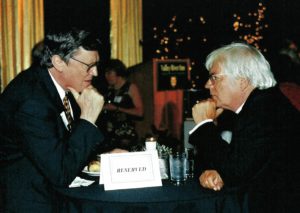
Romey: You have recently retired from the position of Executive Director of the Oregon Bach Festival. How have you continued to be involved, and what would you like to see in the future of the Festival?
Saltzman: Transition of leadership can be difficult. I am pleased and grateful that my successor, Dr. John Evans from BBC Radio 3, United Kingdom, is now president and executive director of the OBF. At his request I serve on the Festival’s Board of Directors. Most exciting is the realization that this year the endowment goal of ten million dollars will have been realized. It is a grateful “Amen” to one of the most meaningful portions of my life. Change is inevitable. The Oregon Bach Festival is in good hands, and will be so in the future. As director emeritus, it is essential that I know my role: advisor when needed, advocate always, and supportive patron when possible.
Romey: Looking back over your career, how did you balance the many responsibilities of work with those of your family?
Saltzman: I do not believe I handled this well. In retrospect, I allowed the professional demands, with their insatiable appetite for time and energy, to overshadow my obligations as a husband and parent. For many years, my wife Phyllis assumed the role of parenting our four daughters while my focus was on teaching at the University of Oregon, conducting at St. Mary’s Episcopal Church, development of the Oregon Bach Festival, and leadership positions within ACDA. Then, after making a lateral transition from teaching to full time administration, my attention moved to building the Oregon Bach Festival, with its need for countless hours of planning, and overseeing IFCM, requiring numerous international trips annually. Phyllis’ willingness to parent in my absence and be supportive of my work, sustained the family during these periods. Furthermore, her involvement in the Festival, hosting social events for musicians and donors, and assisting me in building relationships within the community, was a major factor in the organization’s success. Today, the daughters will acknowledge that the absence of their father during the teen years was a heavy price to pay for whatever success he may have achieved. And I agree. It is a lesson learned, a caution not to be ignored by colleagues in leadership positions.
Romey: Through your work in music education and administration, what do you feel are the challenges facing the next generation of conductors in this country? What advice would you give them?
Saltzman: Major challenges are the disappearance of singing in schools and the diminishing audience for concerts.
According to a new study by Chorus America, 32.5 million adults in the United States regularly sing in a choir, and if children are included, the estimated total is 42.6 million. Noteworthy, to be sure! On the other hand, it is distressing that singing is not part of the curriculum in most elementary and some secondary schools because of budgetary restrictions. Children are becoming illiterate in the purest art form, singing. It is an ill wind that is blowing across the landscape of our country, bringing with it the potential erosion of much that has flourished in the past. The result has major implications for the future of choral music. A crumbling foundation threatens the structure above. The challenge is finding innovative ways to make singing a part of everyday life for children and teens. They are the life blood for choral programs at the secondary and collegiate levels. And, their participation determines whether we will have future audiences involved in and committed to choral music. John F. Kennedy said:
The life of the arts, far from being an interruption, a distraction in the life of a nation, is very close to the center of a nation’s purpose and is a test of the quality of a nation’s civilization.
I applaud conductors, who are offering ancillary choral opportunities outside their academic and civic organizations. If choral music is omitted within our educational framework, then accessible community programs are of vital importance.
Romey: What does the future of choral music look like from your vantage point? Nationally? Internationally?
Saltzman: The age in which we live offers choral conductors throughout the world a vast array of resources heretofore unknown, i.e., direct communication one with another via email and Skype; greater access to international repertoire provided by publishers and organizations such as MUSICA; expanded performance opportunities worldwide; and the accessibility of translated and published works related to our profession. Today, our world is not measured by distance, but by relationships. We have become an extended community rich in diversity, bonded together with that which is common, the choral art.
As to the future, it is imperative that each of us expand our respective horizons and become active participants in this global community. We must continue to forge relationships that allow each of us––as well as our singers and students––to become international citizens of the singing tradition.
H.Royce Saltzman is Director Emeritus of the Oregon Bach Festival, an organization he co-founded with artistic director Helmuth Rilling in 1970. Under his leadership, the Festival grew into one of the preeminent classical music festivals in the United States, celebrating its 40th season this summer (2010, Editor’s note). Saltzman earned a Bachelor’s degree from Goshen College, a Master’s degree from Northwestern University, and a Doctorate from the University of Southern California. In 1964, he joined the faculty of the University of Oregon, and later served as Associate Dean of the School of Music for twelve years. He was national president of the American Choral Directors Association from 1979 to 1981, and president of the International Federation for Choral Music from 1985 to 1993. Saltzman has served on five panels of the National Endowment for the Arts. He is also a member of the Honorary Committee of Zimriya, the World Assembly of Choirs in Israel; was honorary advisor to the China International Choral Festival in Beijing; a past board member of Chorus America; a member of the Advisory Board, Academia Bach de Venezuela in Caracas; and a current member of the Board of Directors for the Internationale Bachakademie-Stuttgart. In 1994, he received the Order of the Cross of Merit, Germany’s highest political-cultural award. Other awards and citations include the 1996 University of Oregon’s Distinguished Service Award, the 2010 Chorus America’s Distinguished Service Award, and alumni awards from Messiah College, Goshen College, Northwestern University, and USC’s Thornton School of Music. In 1997, was honored with the city of Eugene’s First Citizen Award. Royce and his wife, Phyllis, celebrated their 58th wedding anniversary in June and reside in Eugene, Oregon. They have four daughters, Kathy Romey being the eldest, and seven grandchildren. E-mail: saltzman@uoregon.edu
1 The Choral Journal, “President’s Comments”, 6, February 1980
2 The Choral Journal, “President’s Comments”, 4, April 1981
3 The Choral Journal, “President’s Comments”, 6, January 1981
4 Sheila Pritchard, “International Federation for Choral Music: Background, Beginnings, and First Decade”. Doctoral Dissertation, 1994, Vol I, 135-6.
5 Ibid, p. 138.
Permission to publish this interview was granted by the Choral Journal where it was first published in vol.51, n° 1, August 2010.

